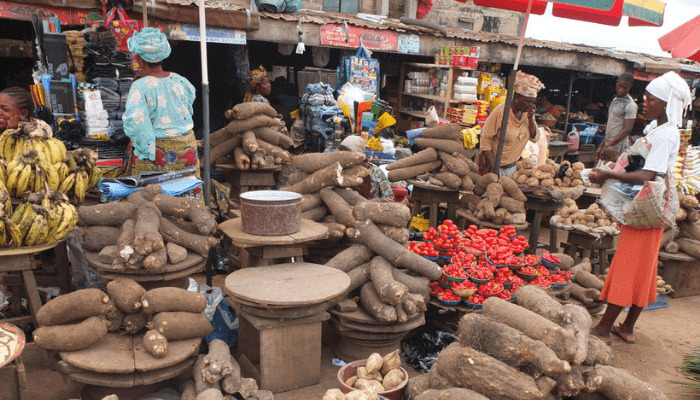On assumption of office in 2015, President Muhammadu Buhari’s vision for agriculture was to work with key stakeholders to build an agribusiness economy capable of delivering sustained prosperity by meeting domestic food security goals, generating exports, and supporting sustainable income and job growth.
In this regard, the president launched the Agriculture Promotion Policy APP, (2016 – 2020) designed to drive import substitution, food security, and job creation among others.
But with a few days left for the administration to wind down, available data has shown that despite commitment to developing the agricultural sector, not so much has been achieved in terms of sectoral growth, food production and employment.
According to the National Bureau of statistics data, the agriculture sector only grew by 3.72 percent in 2015, 4.11 percent in 2016, 3.45 percent in 2017, 2.12 percent in 2018, 2.36 percent in 2019, 2.17 percent in 2020, 2.13 percent in 2021 and 1.88 percent in 2022.
In terms of contribution to the GDP, the sector contributed 24.5 percent in 2016, 25.1 percent in 2017, 25 percent in 2018 and 25.1 percent in 2019.
Also, it contributed 26 percent in 2020, 25.8 percent in 2021 and 25.5 in 2022 respectively.
Despite President Muhammadu Buhari administration’s often claim that the country has achieved food sufficiency, rising food prices and soaring inflation on the back of low output and costly imports continue to simply deflate that claim.
Nigeria’s food import bill running into trillions, in the face of high insecurity along the country’s food belt states of Benue, Kaduna, Katsina, Maiduguri, and Niger.
At the time of formulating that APP document and subsequent launch, authorities well acknowledged that Nigeria still imports a significant amount of food, and does not earn significant foreign exchange from agriculture, “meaning we are losing on both ends.”
Therefore, it became paramount to refresh the strategy to tackle these 2 issues head on. “The Agricultural Promotion Policy (APP) is that refreshed strategy,” Nigerians were told, with the purpose of that policy document being to provide a disciplined approach to building an agribusiness ecosystem that will solve these 2 gaps.
The policy statement was anchored on three main pillars including Promotion of agricultural investment; Financing agricultural development programmes as well as Research for agricultural innovation and productivity.
The target was specifically to double growth of the integrated agriculture sector; Integrate agricultural commodity value chains into the broader supply chain of Nigerian and global industry, driving job growth, increasing the contribution of agriculture to wealth creation, and enhancing the capacity of the country to earn foreign exchange from agricultural exports; Promote the responsible use of land, water and other natural resources to create a vibrant agricultural sector offering employment and livelihood for a growing population; Facilitate the government’s capacity to meet its obligations to Nigerians on food security, food safety and quality nutrition; and Create a mechanism for improved governance of agriculture by the supervising institutions, and improving quality of engagement between the Federal and State Governments.
The policy proposed that the private sector would remain in the lead while government facilitates, as well as provides supporting infrastructure, systems, control processes, and oversight.
The success of the new policy will be driven by the levels of engagement of market place participants, farmers, states, investors, financial institutions, and communities.
Other stakeholders from research laboratories to the Nigeria Customs Service to donors would also play vital roles as authorities assured they would periodically track and publish Performance to help inform smart decision making, in a way that would but reinforce their fundamental goal of leveraging the capabilities of Nigeria to ensure food and income security.
Unfortunately, over six years that the APP was launched, Nigeria still faces those two key challenges in agriculture which the policy promised to deliver on including: inability to meet domestic food requirements, and inability to export at quality levels required for market success.
Failure to ramp up production of food commodities has led to increased food imports, as Nigeria’s cumulative agricultural imports between 2016 and 2019 stood at N3.35 trillion, higher than the agricultural export of N803 billion within the same period. Just in 2021, Nigeria’s official food import bill jumped by 45 per cent to $2.71bn (N1.12tn) in 12 months, according to Central Bank of Nigeria data.
Similarly, agriculture export for 2020 was N321.53 billion, N504.89 billion for 2021 and N598.1 billion for 2022. While on the import side, the total value for agriculture was N1.14 trillion in 2020, N1.966 trillion for 2021 and N1.86 trillion for 2022.
Food inflation, a key component of the overall Consumer Price Index (CPI) quickened to 24.61 per cent in April from 24.46 per cent recorded in March.
Commenting on the performance of the sector in the past eight years, Uchenna Daniel, of Green Grain Nigeria Company said that the sector performed below expectations as it battled the issues of insecurity, and flooding which affected the level of production across the country.
“If you check our imports, agricultural imports were more in this regime than we have had in the past years. We had a situation during this administration where the government banned the importation of maize for example, but our farmers could not meet up with the demand as we saw poultry farmers asking the CBN to lift the ban.
“The government didn’t do so much this time but they made so many promises that were not followed through. And I think our farmers suffered more losses due to the heightened insecurity and floods.”
For Ayodele Olorunfemi, Registrar at the Institute of Agribusiness Management of Nigeria, there is a need for government policies that drive inclusiveness in the agricultural value chain.
“We are not seeing so much from the sector because most policies and programs of the government only benefit some certain people, leaving out the farmers at the grassroots who are actually providing the food.
He also decried the lack of accurate data of farmers which according to him has resulted in their neglect.

